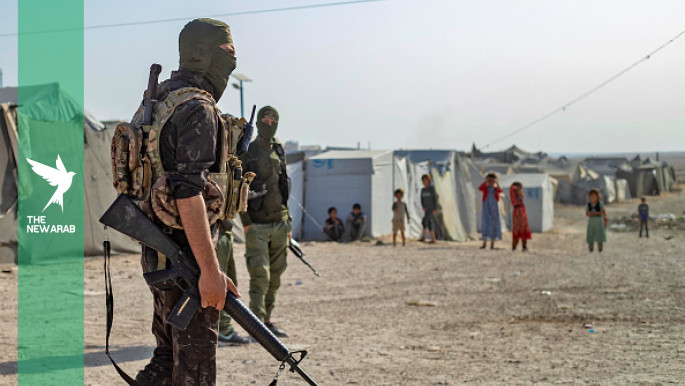The SDF has operated several detention camps holding suspected ISIS members and their families [Getty]
The Kurdish-led Autonomous Administration of North and East Syria has welcomed international calls to repatriate foreign nationals linked to the Islamic State group (IS) from detention camps in Hasakeh province, despite its forces facing mounting criticism over forced recruitment campaigns and renewed clashes with rival factions.
In a statement issued Sunday evening, the administration said it “invited concerned countries to repatriate their nationals from the two camps in order to prevent rising levels of extremism”.
“The response to these appeals has been slow, leaving the Administration to face alone the challenges related to the security and management of these camps,” it added.
The administration also demanded “fair and transparent trials for ISIS members held in designated centres in northeast Syria” under the control of the US-backed Syrian Democratic Forces (SDF).
It said it was ready to begin proceedings locally, describing the move as “a fundamental step to compensate thousands of victims of terrorism”.
The announcement followed a US pledge to establish a new coordination body for repatriations. US Central Command (CENTCOM) said it was setting up a ‘Joint Repatriation Cell’ in northeast Syria to facilitate the return of displaced persons and detainees.
Admiral Brad Cooper praised Iraq, which he said had repatriated “80 percent of its nationals from al-Hol”, and described Baghdad as “leading the repatriation effort”.
“Repatriating vulnerable populations before they are subjected to radicalisation is not just a humanitarian act, but a decisive blow against ISIS’s ability to regenerate itself,” Cooper said.
“Today, I join you all in calling on every country with detainees or displaced persons in Syria to repatriate its citizens.”
The al-Hol camp, once home to more than 70,000 people in 2019, now holds fewer than 30,000.
Conditions remain difficult, though the administration says it is working on planned departures. Al-Hol camp director Jihan Hanan told The New Arab’s Arabic edition Al-Araby Al-Jadeed that the administration had “worked on a list of about 800 people preparing to leave the camp, but the date has not yet been set”.
“There is coordination between us and the other parties, and it is ongoing,” while noting that “a small number of families do not wish to leave the camp,” she added.
Yet as the administration highlights its role in counter-terrorism, the SDF is under fire for domestic practices.
Local and rights groups reported in recent days that the force has conducted sweeping arrest campaigns in Raqqa, Deir az-Zour and Hasaskah, detaining dozens of young men and boys – “including children as young as 14” – to send them into compulsory recruitment camps.
Activists said raids targeted workplaces, homes, and even checkpoints, with some minors seized directly from the street. Families of those detained have accused the SDF of acting outside the law and condemned the practice as forced conscription.
The arrests have sharpened grievances among Arab communities long wary of Kurdish-led rule. Tribal leaders in Deir az-Zour have warned that resentment is rising in towns such as Al-Suwar and Al-Izbah, where opposition to recruitment drives has historically run strong. Reports of arbitrary detention and fatalities in custody have deepened mistrust.
At the same time, the SDF faces renewed military pressure from Turkey and its allied Syrian factions. In recent days, clashes erupted in the eastern Aleppo countryside, with shelling reported near the Tishreen Dam.
Exchanges of fire were followed by reinforcements on both sides. According to Reuters, tensions also flared along the Euphrates after “Kurdish forces upstream killed a relative of an Arab commander” during a gun battle, prompting the commander to dispatch reinforcements to the front.
Analysts note that the juxtaposition of international appeals for fair trials and repatriations with reports of forced recruitment and ongoing clashes highlights the contradictions facing the Autonomous Administration.
While it seeks legitimacy as a partner in counter-terrorism and counter-extremism, it is simultaneously battling deep mistrust from Arab residents and persistent hostility from Turkey.
Turkey considers the SDF an extension of the Kurdistan Workers’ Party (PKK) and continues to target its positions with cross-border strikes, while the Syrian-Kurdish authority accuses Ankara of seeking to destabilise areas under its control.

